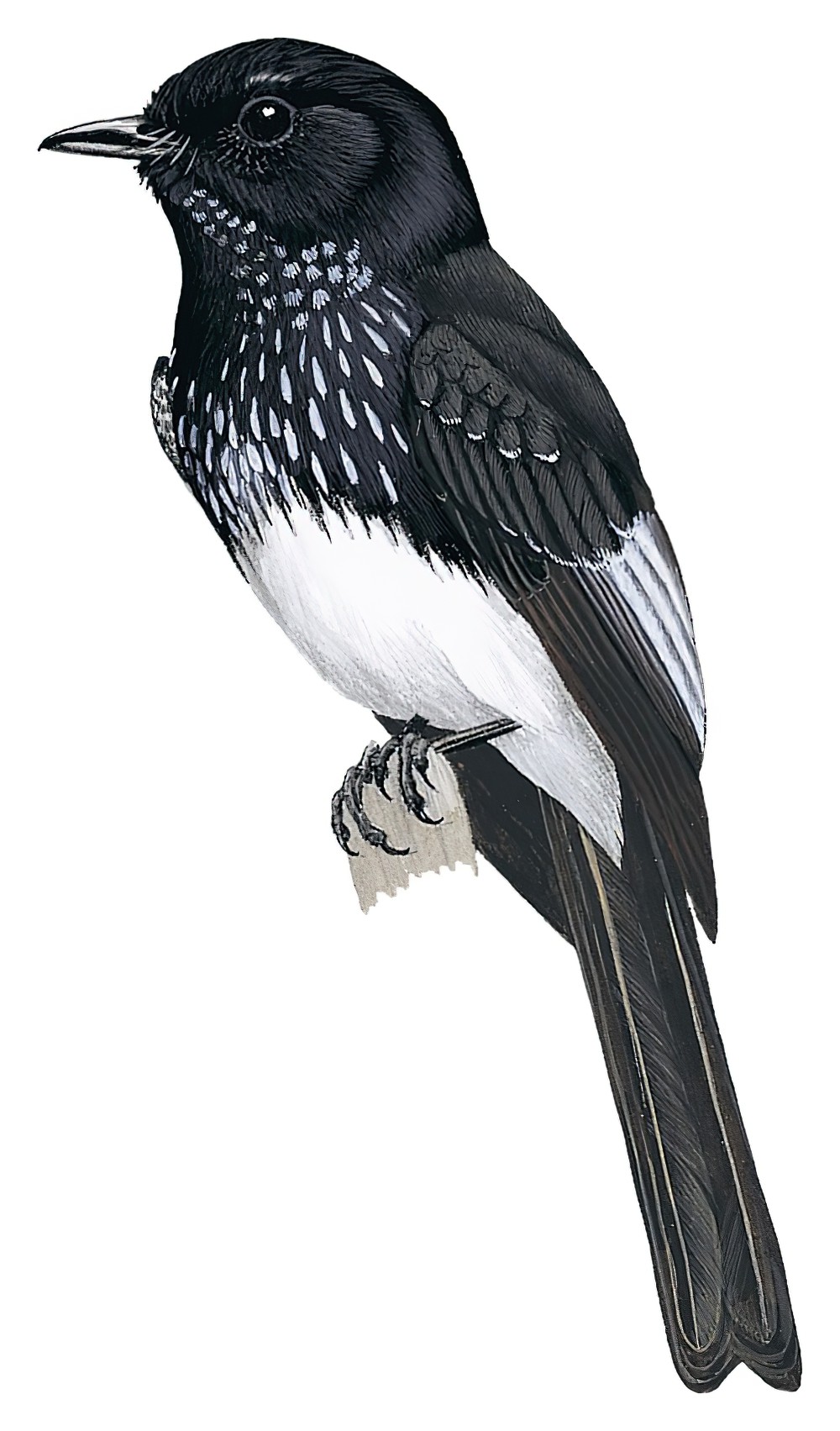Cockerell’s Fantail / Rhipidura cockerelli

Cockerell's Fantail
SCI Name:
Protonym: Sauloprocta cockerelli Nature 20 p.125
Taxonomy: Passeriformes / Rhipiduridae / Rhipidura
Taxonomy Code: whwfan1
Type Locality: Lango, Guadalcanal.
Author: Ramsay, EP
Publish Year: 1879
IUCN Status:
DEFINITIONS
RHIPIDURA
(Rhipiduridae; Ϯ New Zealand Fantail R. fuliginosa) Gr. ῥιπις rhipis, ῥιπιδος rhipidos fan; ουρα oura tail; “Fan-tailed Fly-catcher ... flies always with its tail spread in shape of a fan.” (Latham 1783); "Genus. RHIPIDURA*. Rostrum breve, depressum, basi latum, apice compressum, culmine arcuato; mandibula superiore apice emarginata; naribus basalibus, ovalibus, setis plumulisque fere obtectis; rictu vibrissis confertis mandibulas longitudine fere superantibus instructo. Alæ mediocres, subacuminatæ; remige prima brevissima, secunda duplo longiore, tertia et quarta, quæ est longissima, gradatim longioribus. Cauda elongata, patula, apice rotundata. Pedes mediocres, graciles, acrotarsiis paratarsiisque integris. This group may be at once recognised as offering strong marks of distinction from the true Muscicapa in the fan-like structure of the tail. ... *'Pιπις flabellum, and ουρα cauda. ... 1. FLABELLIFERA. ... Muscicapa flabellifera. Gmel. i. 943. no. 67. Fan-tailed Flycatcher. Lath. Gen. Hist. vi. p. 184. no. 44. pl. 99. ... Fantail.—There is something singular in the habits of this bird. It frequents the small trees and bushes, from whence it suddenly darts at its prey, spreading out its tail like a fan, and to appearance turning over like a tumbler Pigeon, and then immediately returning to the same twig or bough from whence it sprang. ... 2. MOTACILLOIDES. ... It bears a great resemblance to the description of Dr. Latham's Motacilla atricapilla, or the Black-topped Flycatcher of his "General History," but differs in the colour of the bill, back and throat. ... 3. RUFIFRONS. ... Muscicapa rufifrons. Lath. Ind. Orn. Supp. p. 1. no. 5. Rufous-fronted Flycatcher. Id. Gen. Hist. vi. p. 213. no. 95." (Vigors & Horsfield 1827); "Rhipidura Vigors and Horsfield, 1827, Trans. Linn. Soc. London, 15, p. 246. Type, by subsequent designation (G. R. Gray, 1840, List Gen. Birds, p. 32), Muscicapa flabellifera Gmelin [= Muscicapa fuliginosa Sparrman]." (Mayr in Peters 1986, XI, 530).
Var. Ripidura, Rhipadura, Rhissidura.
Synon. Cyanonympha, Howeavis, Leucocirca, Muscylva, Neomyias, Rhipidicidura, Ripidicala, Rupicula, Sauloprocta, Setosura.
rhipidura / rhipidurus
Gr. ῥιπις rhipis, ῥιπιδος rhipidos fan; -ουρος -ouros -tailed < ουρα oura tail.
cockerelli
● James Frederick Cockerell (1847-1897) Australian (born in Hong Kong) collector in Australia, the Aru Is., 1872, Samoa, Fiji and the Bismarcks 1875-1876, and Solomon Is. 1878, son of John T. Cockerell (Philemon, Rhipidura, Trichodere).
● John Thomas Cockerell (1819-1907) English seafarer, storekeeper in Hong Kong 1844-1848, naturalist, settled in Australia 1848, collector in Queensland, and in the Aru Is., 1872 (syn. Zonerodius heliosylus).
SUBSPECIES
Cockerell's Fantail (White-winged)
SCI Name: Rhipidura cockerelli [cockerelli Group]
RHIPIDURA
(Rhipiduridae; Ϯ New Zealand Fantail R. fuliginosa) Gr. ῥιπις rhipis, ῥιπιδος rhipidos fan; ουρα oura tail; “Fan-tailed Fly-catcher ... flies always with its tail spread in shape of a fan.” (Latham 1783); "Genus. RHIPIDURA*. Rostrum breve, depressum, basi latum, apice compressum, culmine arcuato; mandibula superiore apice emarginata; naribus basalibus, ovalibus, setis plumulisque fere obtectis; rictu vibrissis confertis mandibulas longitudine fere superantibus instructo. Alæ mediocres, subacuminatæ; remige prima brevissima, secunda duplo longiore, tertia et quarta, quæ est longissima, gradatim longioribus. Cauda elongata, patula, apice rotundata. Pedes mediocres, graciles, acrotarsiis paratarsiisque integris. This group may be at once recognised as offering strong marks of distinction from the true Muscicapa in the fan-like structure of the tail. ... *'Pιπις flabellum, and ουρα cauda. ... 1. FLABELLIFERA. ... Muscicapa flabellifera. Gmel. i. 943. no. 67. Fan-tailed Flycatcher. Lath. Gen. Hist. vi. p. 184. no. 44. pl. 99. ... Fantail.—There is something singular in the habits of this bird. It frequents the small trees and bushes, from whence it suddenly darts at its prey, spreading out its tail like a fan, and to appearance turning over like a tumbler Pigeon, and then immediately returning to the same twig or bough from whence it sprang. ... 2. MOTACILLOIDES. ... It bears a great resemblance to the description of Dr. Latham's Motacilla atricapilla, or the Black-topped Flycatcher of his "General History," but differs in the colour of the bill, back and throat. ... 3. RUFIFRONS. ... Muscicapa rufifrons. Lath. Ind. Orn. Supp. p. 1. no. 5. Rufous-fronted Flycatcher. Id. Gen. Hist. vi. p. 213. no. 95." (Vigors & Horsfield 1827); "Rhipidura Vigors and Horsfield, 1827, Trans. Linn. Soc. London, 15, p. 246. Type, by subsequent designation (G. R. Gray, 1840, List Gen. Birds, p. 32), Muscicapa flabellifera Gmelin [= Muscicapa fuliginosa Sparrman]." (Mayr in Peters 1986, XI, 530).
Var. Ripidura, Rhipadura, Rhissidura.
Synon. Cyanonympha, Howeavis, Leucocirca, Muscylva, Neomyias, Rhipidicidura, Ripidicala, Rupicula, Sauloprocta, Setosura.
Cockerell's Fantail (Dot-breasted)
SCI Name: Rhipidura cockerelli lavellae
lavellae
Vella Lavella I., Solomon Is.
Cockerell's Fantail (Black-breasted)
SCI Name: Rhipidura cockerelli albina
albina
L. albinus plasterer < albare to whiten < albus white.
Cockerell's Fantail (Spot-breasted)
SCI Name: Rhipidura cockerelli coultasi
coultasi
Cdr. William Ferrell Coultas (1899-1965) US Navy, intelligence officer, collector in the Pacific 1929-1937 (Mark Brown in litt.) (subsp. Aerodramus vanikorensis, subsp. Aviceda subcristata, Monachella, Rhipidura, subsp. Symposiachrus infelix).
UPPERCASE: current genus
Uppercase first letter: generic synonym
● and ● See: generic homonyms
lowercase: species and subspecies
●: early names, variants, mispellings
‡: extinct
†: type species
Gr.: ancient Greek
L.: Latin
<: derived from
syn: synonym of
/: separates historical and modern geographic names
ex: based on
TL: type locality
OD: original diagnosis (genus) or original description (species)












